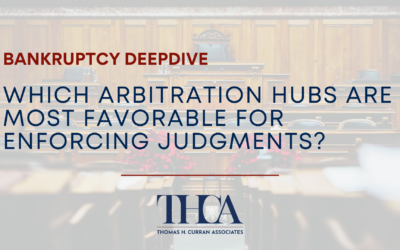What is Chapter 15 Bankruptcy?
Chapter 15 bankruptcy allows foreign debtors, trustees and other estate representatives with insolvency cases pending in other countries access to the U.S. Bankruptcy Courts if the debtor has assets, property, or requires other relief in the United States. One of the goals of Chapter 15 bankruptcy is to promote cooperation and communication between the U.S. Bankruptcy Courts and parties involved in foreign or cross-border insolvency proceedings.
Chapter 15 also grants foreign creditors the right to participate in cases before the U.S. Bankruptcy Courts and bars the courts from discriminating against foreign creditors. Finally, it requires that foreign creditors be notified of U.S. bankruptcy cases and of their right to file claims.
How do you file for Chapter 15 bankruptcy?
A Chapter 15 case cannot be filed unless there is a pending foreign insolvency proceeding. A U.S. Chapter 15 case usually begins with a debtor’s foreign representative files a Bankruptcy Court petition that seeks to recognize the foreign insolvency proceeding.
Does Chapter 15 offer protection to a foreign debtor?
After conducting a hearing, the Bankruptcy Court will make a determination as to whether the case is a “foreign main proceeding” that is taking place where the debtor’s main interests are located. The court may also find the debtor is involved in a “foreign non-main proceeding” taking place where the debtor has an establishment, but not the location of its main interest.
If the court determines that the debtor or estate representative is involved in a foreign main proceeding, it will issue an automatic stay that ends collection actions against the debtor and most other U.S. litigation. In cases where the Bankruptcy Court has recognized a foreign main proceeding, Chapter 15 allows a foreign representative to seek additional relief through the Bankruptcy Courts or in other state and federal courts.
Do the U.S. Courts Play a role in the foreign proceedings?
When a foreign main proceeding is pending, the U.S. Bankruptcy Court’s jurisdiction is usually limited to the debtor’s U.S. assets. This allows foreign entities to protect their rights to U.S. assets while not interfering excessively in another country’s affairs. However, if the Bankruptcy Court finds it necessary, it is allowed to appoint a trustee or examiner in another country on behalf of the debtor’s U.S. bankruptcy estate.
Can Thomas H. Curran Associates help with Chapter 15 cases?
The attorneys at Thomas H. Curran Associates have extensive experience representing clients involved in cross-border bankruptcy cases and can represent the interests of debtors, creditors, financial institutions, investors, and other parties involved in Chapter 15 proceedings. Our lawyers have represented foreign and domestic clients involved in all types of restructuring and liquidation proceedings. They also have extensive litigation experience with disputes involving financially distressed companies.
Bankruptcy Practice Results
Recent successful cases handled by the attorneys from Thomas H. Curran Associates. Find more here »
Supreme Court Denies Final Appeal, Finalizing Judgement Obtained by THCA
On June 24, 2024, the Supreme Court of the United States declined the petition to review filed by Sean Dunne and his ex-wife Gayle...
Thomas H. Curran Associates Secures Appellate Victory as Massachusetts Supreme Judicial Court Denies Appellant’s Attempt to Shortcut Ordinary Appellate Review
Thomas H. Curran Associates recently obtained an appellate victory in the Massachusetts Supreme Judicial Court on May 26, 2023, in the...
Thomas H. Curran Associates win is Affirmed in Florida, U.S. District Court – Client Wins Attorneys Fees
Law: Federal Rule of Civil Procedure 37(a)(5) Case: Premier Capital, LLC v. Larry Bryan (AP) Underlying Bankruptcy Case: In re Larry Bryan...
The Second Circuit Affirms Bankruptcy Fraud Judgment Obtained by Thomas H. Curran Associates, Recognizing the Continuous Concealment Doctrine
Law: Continuous concealment doctrine, 11 USC § 727(a)(2)(A), In re Olivier, 819 F.2d 550 (5th Cir. 1987); In re Boyer, 328 F. App’x 711,...
Thomas H. Curran Associates prevails on barring discharge due to fraud by debtor
Thomas H. Curran Associates recently secured a victory on behalf of an institutional asset manager, where the Bankruptcy Court for the...
Thomas H. Curran Associates prevails on post-trial motions and obtains full security for $23 million dollar financial fraud judgment on behalf of chapter 7 bankruptcy trustee
On February 8, 2022, the United States District Court for the District of Connecticut (Meyer, J.) enter its Order denying defendant Gayle...
Supreme Court Denies Final Appeal, Finalizing Judgement Obtained by THCA
On June 24, 2024, the Supreme Court of the United States declined the petition to review filed by Sean Dunne and his ex-wife Gayle...
Thomas H. Curran Associates Secures Appellate Victory as Massachusetts Supreme Judicial Court Denies Appellant’s Attempt to Shortcut Ordinary Appellate Review
Thomas H. Curran Associates recently obtained an appellate victory in the Massachusetts Supreme Judicial Court on May 26, 2023, in the...
Thomas H. Curran Associates win is Affirmed in Florida, U.S. District Court – Client Wins Attorneys Fees
Law: Federal Rule of Civil Procedure 37(a)(5) Case: Premier Capital, LLC v. Larry Bryan (AP) Underlying Bankruptcy Case: In re Larry Bryan...
The Second Circuit Affirms Bankruptcy Fraud Judgment Obtained by Thomas H. Curran Associates, Recognizing the Continuous Concealment Doctrine
Law: Continuous concealment doctrine, 11 USC § 727(a)(2)(A), In re Olivier, 819 F.2d 550 (5th Cir. 1987); In re Boyer, 328 F. App’x 711,...
Supreme Court Denies Final Appeal, Finalizing Judgement Obtained by THCA
On June 24, 2024, the Supreme Court of the United States declined the petition to review filed by Sean Dunne and his ex-wife Gayle...
Thomas H. Curran Associates Secures Appellate Victory as Massachusetts Supreme Judicial Court Denies Appellant’s Attempt to Shortcut Ordinary Appellate Review
Thomas H. Curran Associates recently obtained an appellate victory in the Massachusetts Supreme Judicial Court on May 26, 2023, in the...
Thomas H. Curran Associates win is Affirmed in Florida, U.S. District Court – Client Wins Attorneys Fees
Law: Federal Rule of Civil Procedure 37(a)(5) Case: Premier Capital, LLC v. Larry Bryan (AP) Underlying Bankruptcy Case: In re Larry Bryan...
Bankruptcy Areas of Expertise
- Bankruptcy Litigation
- Bankruptcy Trustee Representation
- Avoidance & Recovery Actions
- Chapter 11 Trustees & Examiners
- Discharge Litigation
- Bankruptcy Fraud Investigations
- Cross Border Foreign Litigation
- 363 Bankruptcy Sales
- Bankruptcy Preference Actions
- Involuntary Bankruptcy
- Chapter 11/13 Plan Objections
Bankruptcy News
Judicial Comity Meets Sovereign Debt
Judicial comity is a discretionary doctrine by which U.S. courts recognize the legislative, executive, or judicial acts of another nation,...
Global Insolvencies Are Rising Again – What To Expect in 2026
After several years of economic turbulence, a renewed rise in global insolvencies is expected in 2026. According to Allianz Trade’s Global...
Which Arbitration Hubs Are Most Favorable for Enforcing Judgments?
As insolvency disputes increasingly intersect with international arbitration, creditors are asking: which jurisdictions provide the most...
Crypto Bankruptcies and the Push for Custody Reform
The crypto sector remains under intense financial and regulatory scrutiny. The U.S. House of Representatives passed the Digital Asset...
The State of Healthcare Bankruptcy in the U.S.: Why 2025 Is a Turning Point
Jennifer Riggins sits down with Thomas Curran, Managing Partner of Thomas H. Curran Associates, to unpack the accelerating wave of...
Expanding in the Southwest: From Insolvency in Oklahoma to Asset Recovery in Texas
In this episode, Jennifer sits down with Thomas Curran, founder of Thomas H. Curran Associates, to explore the rapidly evolving world of...
Judicial Comity Meets Sovereign Debt
Judicial comity is a discretionary doctrine by which U.S. courts recognize the legislative, executive, or judicial acts of another nation,...
Global Insolvencies Are Rising Again – What To Expect in 2026
After several years of economic turbulence, a renewed rise in global insolvencies is expected in 2026. According to Allianz Trade’s Global...
Which Arbitration Hubs Are Most Favorable for Enforcing Judgments?
As insolvency disputes increasingly intersect with international arbitration, creditors are asking: which jurisdictions provide the most...
Crypto Bankruptcies and the Push for Custody Reform
The crypto sector remains under intense financial and regulatory scrutiny. The U.S. House of Representatives passed the Digital Asset...
Judicial Comity Meets Sovereign Debt
Judicial comity is a discretionary doctrine by which U.S. courts recognize the legislative, executive, or judicial acts of another nation,...
Global Insolvencies Are Rising Again – What To Expect in 2026
After several years of economic turbulence, a renewed rise in global insolvencies is expected in 2026. According to Allianz Trade’s Global...
Which Arbitration Hubs Are Most Favorable for Enforcing Judgments?
As insolvency disputes increasingly intersect with international arbitration, creditors are asking: which jurisdictions provide the most...
Contact Us
Are You In Need of Legal Counsel for a Bankruptcy Matter, Business Transaction, or Commercial Litigation?
Contact our team today.
Call us at (617) 207-8670 or use the quick contact form below.
Austin Office
7710 N. FM 620
Building 13-D
Austin, TX 78726
Boston Office
15 Broad Street
Suite 610
Boston, MA 02109
New York Office
305 Broadway, Suite 700
New York, NY 10007
London Office
The Leadenhall Building
Level 30
122 Leadenhall Street
London EC3V 4AB
Tags: what is chapter 15 bankruptcy how to file for bankruptcy chapter 15 filing personal bankruptcy chapter 15






